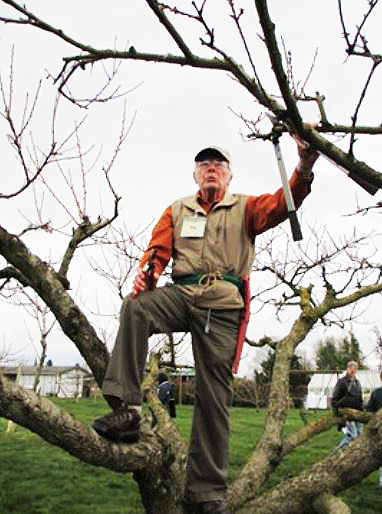Bob Norton, the king of apples, brings his passion for fruit to Vashon
Originally published in The Vashon-Maury Beachcomber on Nov 21 2007 (reproduced here by permission).
By Erin Kenny

Photo courtesy of Western Washington Fruit Research Foundation
Some people are so passionate about fruit that they will travel around the globe in search of new varieties. This past fall, Dr.Bob Norton lead a group of 40 such people, six from Vashon, on an educational venture to Northern Italy with the Western Cascade Fruit Society. The object of their desire? Abate Fetel, a pear that winters over exceptionally well and can be grafted to grow in the Northwest.
Norton is the founder of the Vashon Island Fruit Club. And according to those who know him well, this 82-year-old doctor of plant physiology is the force behind the thriving organization.
“Bob is the spark plug that keeps our energy going,” said Ron Weston, current president of the fruit club.
Vashon was a major fruit growing center in the 1920s, and a lot of Islanders inherited historical plantings of various types of fruits. According to Weston, the Vashon Island Fruit Club is now one of the most dynamic and fastest growing chapters of the Western Cascade Fruit Society. In just three years, it went from 25 to more than 150 members.
I met with Norton at his Maury Island orchard last month on one of those crisp, sun-filled fall days. As we meandered past rows of rare, exotic and heirloom fruit trees, Norton explained why apples are ideally suited to being a locally grown produce no matter what their country of origin. Apples are a botanical oddity in that the seeds are not an exact clone of the parents, so if you want to get the exact same fruit as the parent tree, you must graft a bud or a twig onto another root stock. Because a root stock can be chosen to suit various locales, this enables one to grow any type of apple in a wide variety of climates and soil conditions.
Norton, a handsome man whose smooth skin and full head of hair defies his age, can trace his lifelong interest in the natural world to his childhood. With a chuckle he cites chemistry experiments as a teen where he “basically blew things up in the basement.” Norton also has fond memories of his father donating his garden harvest to his young son, who then loaded it into a wagon and sold it throughout the neighborhood.
He can pinpoint his excitement in the marriage of chemistry and biology to the moment he first saw hydroponics, the growing of plants in a medium of water without soil.
Norton began his academic career by studying chemical engineering until he was drafted into the U.S. Navy. After World War II, Norton attended Rutgers University and received his bachelor’s degree in ornamental horticulture and his master’s in pomology, the study of fruit and nut trees. Norton completed his studies with a Ph.D. in plant physiology at Michigan State University.
After a teaching stint at Utah State in the early 1960s, Norton spent 30 years as the supervisor for Washington Sate University’s Research Station at Mount Vernon. The main objective of the research station is to solve plant-related problems and develop cost-effective and environmentally sound plant production practices based directly on results from experimental research trials. Before his arrival, the organization was only experimenting with seed and vegetable crops; Norton started the station’s fruit crop trials.
A few weekends ago, the fruit club hosted a fall fruit festival to illustrate the amazing variety of fruits that can be grown right here on Vashon. Being in his element, Norton was animated as he answered questions about varieties, grafting, insect infestations and patents for new strains. Among the incredible array of Vashon fruits, unceremoniously displayed on paper plates with a knife to cut slices for tasting, were several varieties of apples with familiar names that one would see at the grocery store, such as Jonagold and Gala. Yet these apples were not shipped from somewhere else; they were grown right here in someone’s yard and tasted so much better than store-bought. In fact, there was a Golden Delicious apple that was actually delicious and that came from a tree that’s been producing right here on Vashon for 75 years.
Norton explained that the loss of quality in today’s store-bought apples’ flavor and texture is mostly a result of the development of a process called Controlled Atmosphere (CA) storage, which enables apples to be kept year-round. “The stored apples are picked immature and put into storage where most of the oxygen is depleted, essentially putting the apples to sleep,” Norton explained. Much later, the apples are artificially ripened, resulting in diminished sugar levels, he added. “The CA apples are only 11 percent sugar, while most ripe apples are about 14 percent,” he said.
Norton’s dream is that members of the Island’s fruit club will be able to supply an increasing amount of locally produced fruit to area grocery stores.
“Why are we shipping apples around the world when we could be eating them fresh and in season right here?” Norton lamented. His ideal scenario would be eating Vashon-grown apples for six months out of the year and New Zealand apples the other six months, so we would always be eating apples in season. With his infectious enthusiasm and gregarious nature, there is no doubt that Norton’s passion is the driving force behind the meteoric rise in Vashon’s interest and pride in its local fruits.
© 2014 by Erin Kenny. Erin Kenny is the founder and director of the non-profit Cedarsong Nature School www.cedarsongnatureschool.org.